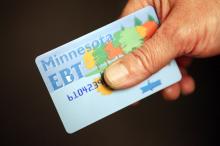Banks Racking Up Fees On Welfare Recipients
Banks Racking Up Fees On Welfare Recipients
In 41 states banks have signed comprehensive agreements with states to furnish the delivery of state-provided benefits from unemployment insurance and food stamps to cash assistance for poor families. By instituting fees and other penalties, these banks are essentially extracting public funds from the people in these programs that are supposed to be received that money in government assistance. Wells Fargo, JP Morgan Chase, Bank of America, and U.S. Bank, among others, are the financial institutions that hold contracts with various states to provide these prepaid debit cards, and who are chipping away at the livelihood of the most vulnerable people in our country.
A spokesperson for US Bancorps, of which U.S. Bank is a subsidiary, told The Huffingont Post that customers are informed of the fees that pertain to their debit cards, and that many customers prefer the debit cards because they’re nearly indistinguishable from other debit cards. Of course, the individuals that depend on these government programs aren’t customers, they’re recipients of government funds due to life circumstances, and unless they go through the process of furnishing the state with alternate means of receiving funds, many of them don’t have a choice about how they receive their assistance.
In 2008, California’s welfare families paid $8 million in surcharges to banks using their assistance dollars. According to The Western Center on Law and Politics, welfare recipients in California will pay $16 million in banking surcharges. However, states largely save money by allowing banks to handle the disbursement of welfare monies. In 2007, Oregon reported saving $11 million statewide in printing, mailing, and other disbursement costs. The Treasury Secretary of that state, James Sinks, told HP that the notion that fees are unfair is “specious” and “laughable”. “Are there fees, yes,” says Sinks, “But there are ways for people to access their money for free and there are robust ways to do that. I don't believe that most people are paying fees." Says the guy in the state office…according to a report by his own state, 40% of welfare recipients use a U.S. Bank Reliacard debit card, and almost all of them have incurred fees on the monthly spending.
For those individuals that like to characterize the poor and unemployed as simply lazy, I believe this is one more piece of evidence to the contrary.


